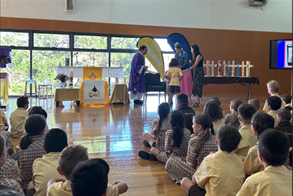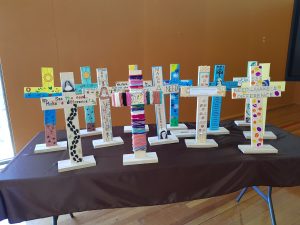Term 1 Week 6
Last Tuesday was a day to celebrate our school with the Beginning of the year mass celebrated by Fr Peter. We had hoped that Bishop Terry Curtin would also join us but unfortunately he was held up and only arrived at the end of the mass. He was able to then spend time with our Yr 6 children in preparation for Confirmation. Fr Peter’s homily spoke about all of us working together to nurture and support our children. He then asked children what they would like to be when they grow up. He was impressed with many wanting to be doctors, lawyers, a paediatrician, teachers but was even more impressed when two children said they wanted to be priests!! We were amused when a parent reported the conversation on the way home from school that night, “Mum I saw God today! (Fr Peter!)” Not God but a Godly man. The mass highlighted the spiritual dimension that our catholic school is centred on and reminded us of the many aspects of school life from academic, physical activity, emotional support and spiritual development. Thank you to Mrs Barone and all the staff for organising such a beautiful and reverent mass.

Our Parents Auxiliary and MOSO group have been working hard behind the scenes. The PA ran a successful lunch order day two weeks ago. The introduction of ‘Spriggy’ to order and make payments has made their job much more streamlined and efficient. Our Icy poles have been selling fast with the hot weather. Thank you to the mums who have come to school to help with this. A reminder to donate Easter eggs and Easter items for the Easter raffle. Raffle tickets will be going home soon. The raffle will be drawn on Thursday 28th March at 12.30pm, last day of term 1. MOSA organised their first event at the Keilor Bowls Club. It was a great night with twenty-eight dads attending throughout the night. All of the dads attending for the first time mentioned what a great idea it was and that they are already looking forward to the next catch up. Contact Claire Boskovic-0432538556 if you can assist with the Parents Auxiliary and Teghan Henderson 0418 338 354 for more information about MOSA.

St Augustine’s has been listed on the 2021-22 BARR, Bushfire At Risk Register. This means that we would be required to close on CODE RED (Catastophic) days. Fire danger levels and ratings range from low-moderate, high, very high, severe, extreme to code red. Code red applies to the worst conditions for a bush or grass fire. The Bureau of Meteorology (BoM) issues a Code Red Fire Danger Rating warning for the weather district in which this school is located. Where possible, three (3) days notice of a planned closure will be provided. However, a Code Red days notice may be provided. Once the final decision to close is confirmed at 12 noon the day prior, this decision will not change – regardless of any changes in the weather forecast. This will help limit confusion and help families plan for how their children will be cared for when their school is closed. When a school is closed in response to bushfire risk, no one, including staff, contractors and other users, will be permitted on site. All communication will be through the school app so please ensure you have this downloaded on your phone. It should be noted that there has not been a determined Code Red day since January 2010.We work with an Emergency Management company to work through all scenarios and the whole school engages in an emergency management drill each term. Staff are all trained as emergency management wardens annually.

We have a few children at the school with moderate to severe allergies with some classified as anaphylactic. This can be life threatening for these children. St Augustine’s does not ban certain types of foods (e.g., nuts) as it is not practicable to do so and is not a strategy recommended by the Department of Education (DE) or the Royal Children’s Hospital. However, the school tries to avoid the use of nut-based products in school activities. Where this is not possible parents can communicate with teachers or those involved to work out the ingredients. I request that parents do not send items with nuts in them to school if possible. Talk to your child about alternatives that they may include in their lunch. Remember that this will support the children in the school where nuts can be life threatening! We are a no food sharing school which includes birthday food, ie cake, lollies. If you want to send something to the class to help celebrate a birthday I suggest a goodie bag with stickers, pencil, rubber etc.. Please no balloons as these can be a choking hazard. Our aim is to keep all children safe and well.
At St Augustine’s we encourage ongoing communication between home and school. Children will often come home with stories about their day that bring joy but at times may concern you. The appropriate way to communicate with the school is to first make an appointment with the teacher to discuss the concern. We know that stories can be misconstrued or take on a different perspective through the eyes of a child. A teacher can help clarify the issue and assist in helping the distressed child. Email is an efficient and effective tool that supports timely communication. It strengthens the goodwill and the positive partnership between parents, students and the school to enhance the well being and learning opportunities for students. Emails are an efficient way to set up a suitable time to speak to a teacher rather than become a discussion about your child’s academic progress, learning expectations or behavioral issues. Emails should be short, to the point and contain only essential facts. Teachers will take the discussion offline and call for a meeting if they feel that ongoing discussion is required. Be aware that ‘out of hours’ or ‘in class time’ emails may not be answered immediately nor will staff respond to abusive or aggressive emails. They will be responded to within 2 working days from receipt of the email. Parents should contact the office to inform a teacher of matters of immediate urgency eg. a child needing to go to after care, a change in pick-up arrangements as emails might not be read in time to act upon requirements. Teacher emails are the first letter of their name followed by their surname and @sakeilor.catholic.edu.au eg. Adele Mifsud – amifsud@sakeilor.catholic.edu.au.
Young children look to us for guidance and support when dealing with friendship issues, behaviour regulation and emotional challenges. They are learning about how to be a friend, how to respond to others in a conflict situation, how to get along and how to be part of a group or team. Children look to us and our behaviours and guidance for ways to behave appropriately. There will always be situations where a ‘nasty’ comment has been made, where someone may have been teased about something that is perceived as different, an argument over a game that has gone wrong and generally not seeing eye to eye. It is easy for us to jump to thinking that our child is being bullied, especially when your child comes home emotional and needs to offload to you at the end of the day. We then get emotional! The school has a process that we go through with every conflict and every incident to support all children and move forward restoratively. Our first default is to work out what has been going on and move towards restoring the relationship and helping the child with their behaviours moving forward. Firstly the children are encouraged resolve the situation themselves, next they are encouraged to seek teacher assistance. The teacher will then gauge if this is something that can be resolved on the spot or whether it needs further investigation. In this case it may be referred to the classroom teacher or a leader to speak with all students involved and hear all sides of the story. Their professional judgment is then used to determine what may be the cause of the conflict, what actually occurred and next steps. Next steps could include further meetings with the children, a call to all parents to discuss the conflict, a call/meeting with parents to help support the child, further meetings with the wellbeing leader, possible consequences such as removal from the yard for a short time, letter of apology, meeting between the children to express how they felt and what next.
We are again reminded that behaviour management is also part of an educational approach, helping to teach our young children how to interact, socialise, use appropriate language and develop strategies to use moving forward. Working with children and families is also highly confidential and aimed at maintaining the dignity of all involved. We do not discuss this with other families. This is a restorative approach not a punitive approach. This is why you sent your child to a catholic school. Please speak to the teacher if you have any concerns about your child and we can then determine what needs to be done next.
We have had recent sightings of a snake on the grounds. The children are all aware of what to do when they see a snake, Never approach a snake, Stand still, Back away slowly keeping the snake in sight, Inform the office immediately. Snake catchers are called, however they re not often successful in catching the snake if we have lost sight of it. I have started a process to snake proof the school by removing vegetation where they would find their food (lizards, bugs etc..), ensuring bins are emptied from classrooms daily and adding mesh under the school to prevent snakes from moving into these areas. Snakes are a natural part of our environment and we could never actually remove them for good but we continue to work with experts who can advise us on the best way to deter them from our school.
A reminder that Monday 11th March is a public holiday and Tuesday 12th March is a school closure day. There are no children at school on these days
I will be on leave from 15th March to 28th March. Jacinta Fedoruk and Clare Kheir will be acting in my place during this time.






